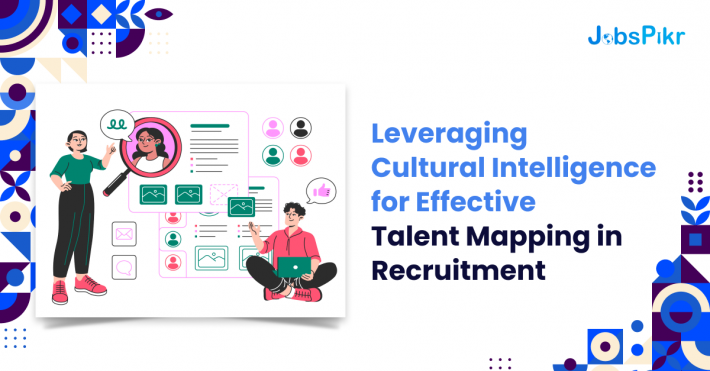- What is Cultural Intelligence? Why Does it Matter in Recruitment?
- Why Cultural Intelligence is Vital for Recruitment and Talent Mapping?
- Why Talent Mapping is Essential for Modern Recruitment Success?
- How Cultural Intelligence Enhances Talent Mapping Recruitment?
- How Talent Intelligence Tools Drive Cultural Intelligence in Recruitment?
- Best Practices for Incorporating Cultural Intelligence in Talent Mapping
- Guide to Implementing Cultural Intelligence in Recruitment
- Real-World Example: Companies Excelling in Cultural Intelligence
- What’s Next for Cultural Intelligence? Trends & Insights
- Conclusion
Thanks to the rapid development of globalization, businesses are no longer restricted by a limited geographical reach and local workforces. As businesses transfer operations on an international level, there is a higher chance of diversity among the employees, turning cultural intelligence into an essential aspect while formulating recruitment practices. With cultural intelligence comes enhanced collaboration and productivity that are essential in seeking, nurturing and retaining employees as well.
This article aims to discuss the relation between cultural intelligence and recruitment with the integration of talent intelligence tools that aid in formulating effective recruitment practices.
What is Cultural Intelligence? Why Does it Matter in Recruitment?
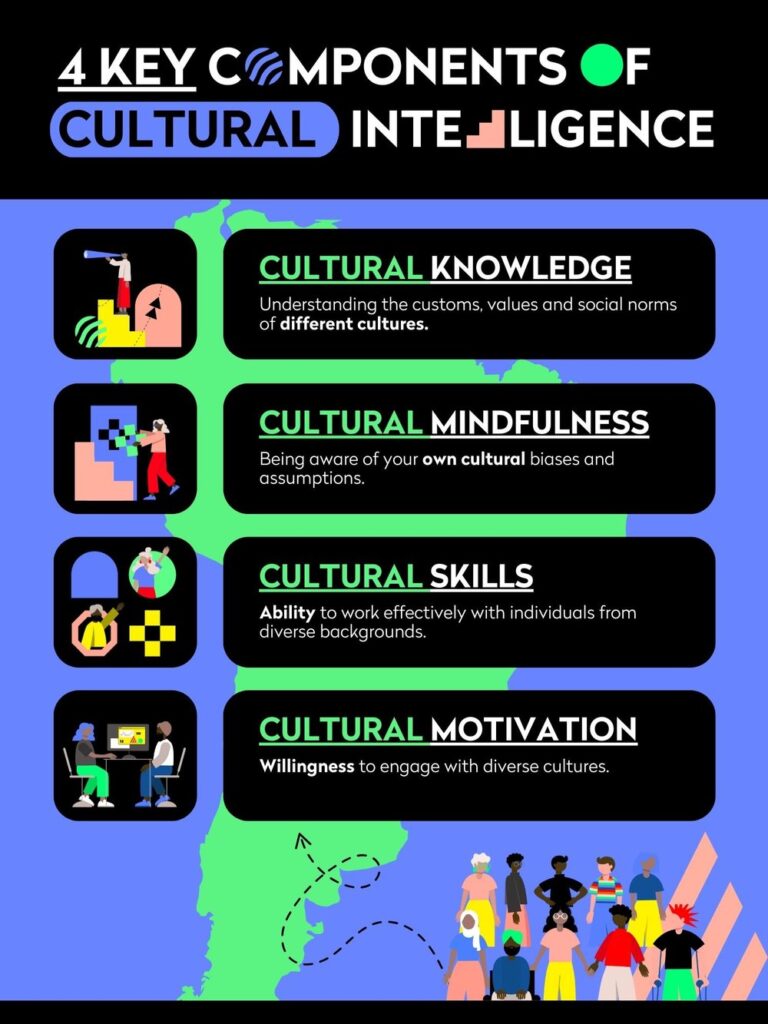
Image Source: Michael Mauro
Cultural intelligence (CQ) is the capacity that allows one to comprehend people belonging to foreign cultures, communicate with them appropriately, and interpret their actions. It is more than simply being aware of one’s culture as it involves being flexible and compassionate in the complex interaction between societies. It includes:
- Cognitive CQ: The ability to learn and understand different morals and values.
- Emotional CQ: The ability to empathize and be sensitive towards cultural differences.
- Behavioral CQ: The ability to change language and behaviors to fit into different cultures.
For recruitment and talent mapping, cultural intelligence ensures that hiring managers and HR teams can:
- Identify talent that aligns with the company’s global objectives.
- Reduce cultural friction in diverse teams.
- Improve employee engagement and retention by addressing cultural nuances.
Companies with higher CQ are often better equipped to manage diverse teams, foster inclusivity, and drive better business outcomes.
Why Cultural Intelligence is Vital for Recruitment and Talent Mapping?
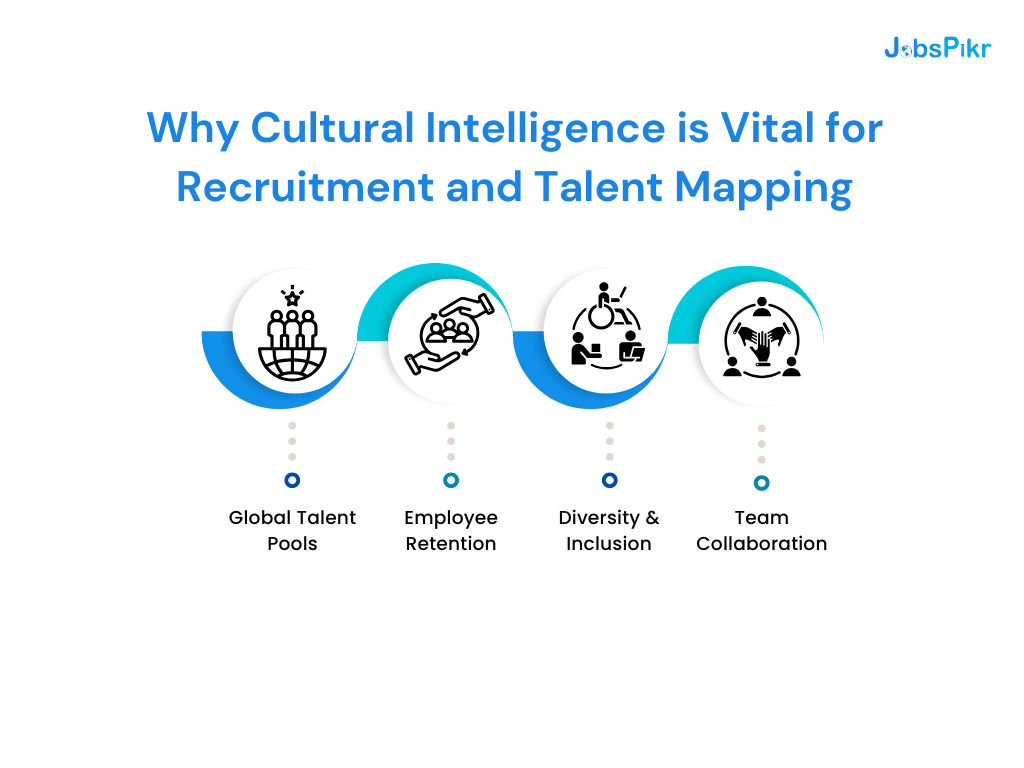
- Global Talent Pools: Remote work has erased geographical barriers, but cultural barriers remain.
- Employee Retention: Misunderstood cultural expectations can lead to friction and higher attrition rates.
- Diversity and Inclusion Goals: CQ ensures that diversity efforts translate into meaningful inclusion.
- Enhanced Team Collaboration: Teams with high cultural intelligence are better equipped to handle cross-cultural challenges.
Why Talent Mapping is Essential for Modern Recruitment Success?
Talent mapping recruitment is a strategic process that involves identifying and analyzing the skills, experience, and potential of candidates to align them with organizational goals. It’s not just about filling current vacancies but planning for long-term talent needs.
Why is Talent Mapping Crucial?
- Proactive Workforce Planning: Anticipate future skill gaps and address them.
- Enhanced Talent Pools: Build a robust talent pipeline.
- Improved Candidate Fit: Align skills, values, and cultural compatibility.
When paired with cultural intelligence, talent mapping becomes even more effective, enabling HR teams to not only find the right skills but also ensure cultural fit for global teams.
How Cultural Intelligence Enhances Talent Mapping Recruitment?
1. Aligning Talent with Organizational Culture
Every organization has a unique culture, and cultural intelligence helps HR professionals identify candidates who can seamlessly integrate into it. Talent mapping, backed by cultural insights, ensures recruiters go beyond technical skills and evaluate candidates’ ability to thrive in diverse environments.
2. Improved Cross-Cultural Collaboration
When businesses operate across different regions, cross-cultural collaboration becomes essential. Cultural intelligence enables HR teams to anticipate cultural barriers and proactively address them during the talent mapping process.
3. Enhanced Retention Strategies
Retention often hinges on an employee’s ability to feel understood and valued in their workplace. Talent mapping combined with cultural intelligence helps create personalized onboarding and retention plans that consider cultural preferences and communication styles.
4. Data-Driven Cultural Insights through Talent Intelligence
Modern talent intelligence platforms integrate cultural data to provide actionable insights. These tools analyze employee performance, engagement, and cultural adaptability to guide recruitment and workforce strategies.
How Talent Intelligence Tools Drive Cultural Intelligence in Recruitment?
Talent intelligence tools are transforming the way HR teams approach cultural intelligence and talent mapping. These tools use advanced data analytics and AI to:
- Identify cultural trends within teams.
- Assess cultural adaptability of candidates.
- Provide actionable insights for workforce planning.
Key Benefits of Using Talent Intelligence in Recruitment:
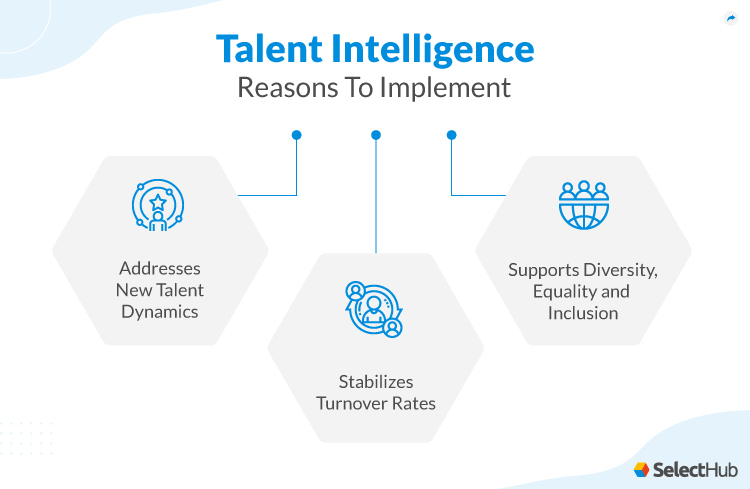
Image Source: SelectHub
- Reduced Bias in Hiring: Data-driven insights minimize unconscious cultural biases.
- Enhanced Candidate Screening: Evaluate cultural alignment alongside technical skills.
- Strategic Workforce Planning: Anticipate cultural challenges in global teams.
For example, platforms like JobsPikr provide HR leaders with actionable insights, helping them build a culturally intelligent talent pipeline.
Challenges in Implementing Cultural Intelligence
Despite its advantages, implementing CQ in recruitment comes with challenges:
- Resistance to Change: Existing biases can hinder adoption.
- Data Integration: Not all organizations have systems in place to collect and analyze cultural data.
- Scalability: Applying cultural intelligence consistently across large organizations is challenging.
- Training Costs: Continuous training requires time and investment.
Best Practices for Incorporating Cultural Intelligence in Talent Mapping
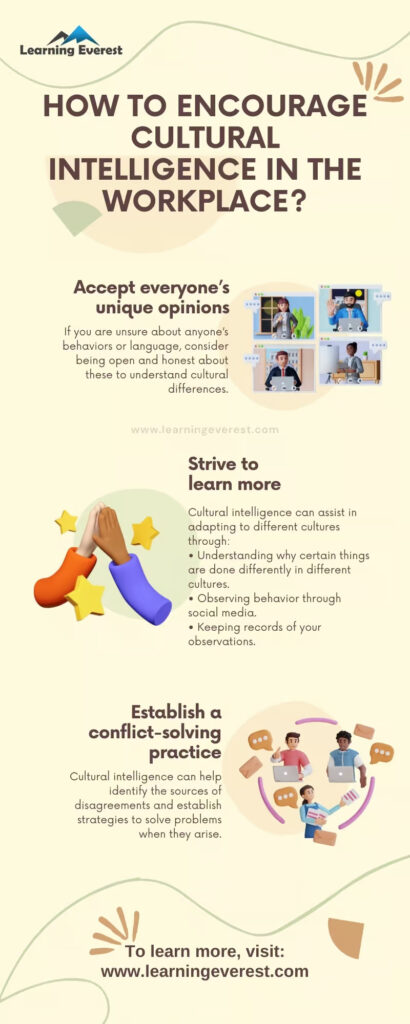
Image Source: Learning Everest
1. Invest in Cross-Cultural Training for HR Teams: Equip recruiters and HR professionals with cultural intelligence training to improve communication and assessment during the hiring process.
2. Use Data to Drive Decisions: Leverage talent intelligence tools to gather cultural insights from your workforce data and use them to guide recruitment strategies.
3. Prioritize Soft Skills in Recruitment: While technical skills are essential, candidates with strong cultural adaptability, empathy, and emotional intelligence often make better long-term hires.
4. Create Culturally Inclusive Policies: Develop policies that respect cultural differences, such as flexible holidays, inclusive communication channels, and unbiased performance evaluations.
5. Foster a Culture of Belonging: Employees are more likely to stay in organizations where they feel they belong. Cultural intelligence plays a key role in creating such environments.
Guide to Implementing Cultural Intelligence in Recruitment
Step 1: Assess Your Organization’s Cultural Competency
- Conduct CQ audits.
- Identify areas where cultural misunderstandings occur.
Step 2: Train HR Teams on Cultural Intelligence
- Provide workshops and training sessions.
- Equip hiring managers with tools to assess cultural fit.
Step 3: Integrate Cultural Assessments into the Recruitment Process
- Include cultural adaptability tests in interviews.
- Use situational questions to evaluate cultural awareness.
Step 4: Use Talent Intelligence Platforms
- Leverage tools that offer cultural insights and predictive analytics.
- Monitor cultural trends in workforce data.
Step 5: Build Inclusive Policies
- Create policies that address cultural sensitivities.
- Offer flexible holidays and culturally inclusive team-building activities.
Step 6: Measure and Iterate
- Collect feedback from employees on cultural inclusion efforts.
- Refine strategies based on results.
Real-World Example: Companies Excelling in Cultural Intelligence
1. Unilever
Unilever uses cultural intelligence to guide its global recruitment strategies, ensuring alignment with local markets while maintaining its core values.
2. Google
Google emphasizes cultural intelligence during hiring to ensure diversity isn’t just about representation and inclusion.
Both companies use talent intelligence platforms to map talent effectively and build cohesive, multicultural teams.
What’s Next for Cultural Intelligence? Trends & Insights
As the global workforce becomes more interconnected, cultural intelligence will become non-negotiable in talent mapping and recruitment strategies. Emerging technologies like AI, predictive analytics, and real-time workforce data will further streamline how HR teams apply cultural insights to hiring and retention processes.
Some Emerging Trends are…
- AI-powered cultural adaptability assessments.
- Real-time talent intelligence dashboards.
- Global collaboration tools with cultural context features.
Companies that invest in both cultural intelligence and talent mapping today will be better positioned to lead in a competitive global talent market.
Conclusion
Being culturally intelligent is more than just a fad; it cuts out as a business resource and competitive advantage. It is more so the case in the sphere of recruitment which involves talent mapping, where it is not only about skill sets but also about human relationships, styles of communication and culture.
Employers will be able to overcome cultural barriers, improve the engagement of employees, and prepare their workforce strategies with the help of talent intelligence tools.
Enabling you to make informed decisions about cultural intelligence, JobsPikr will allow you to start developing culturally balanced teams. Sign up now!
